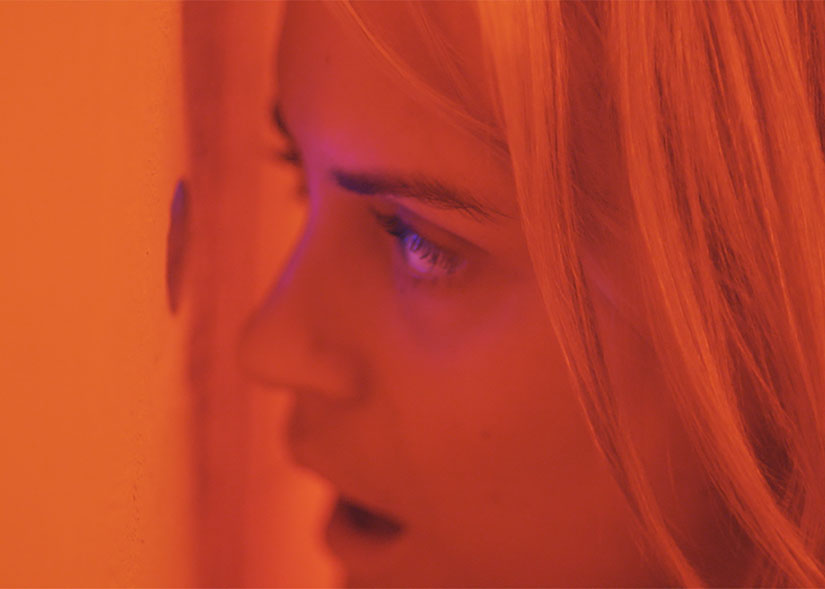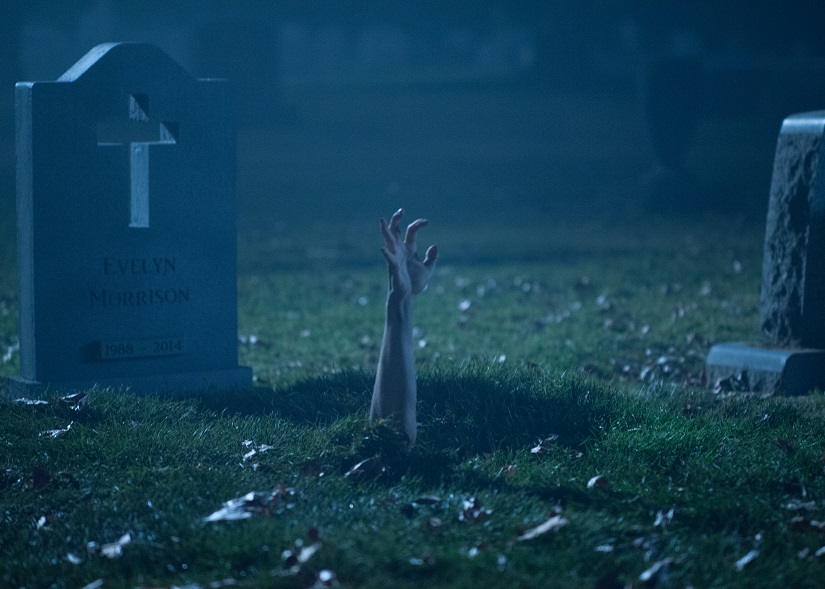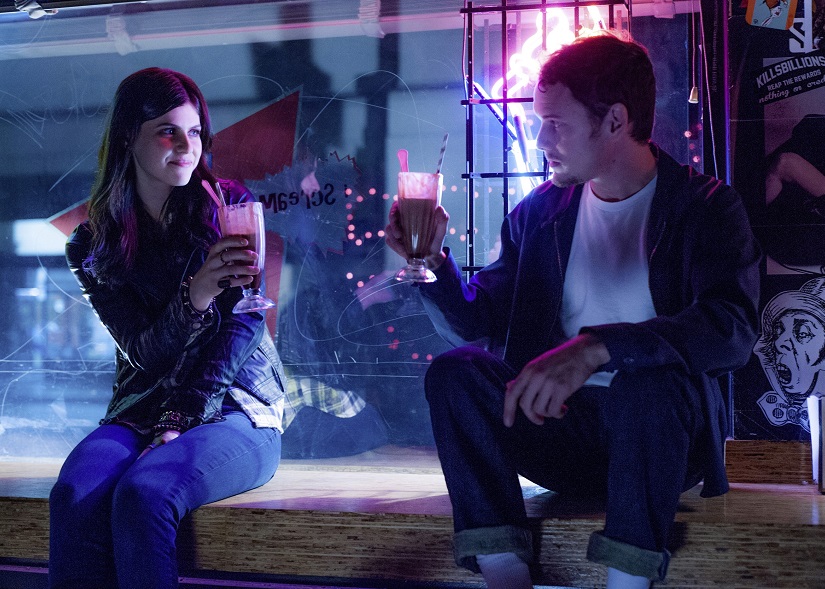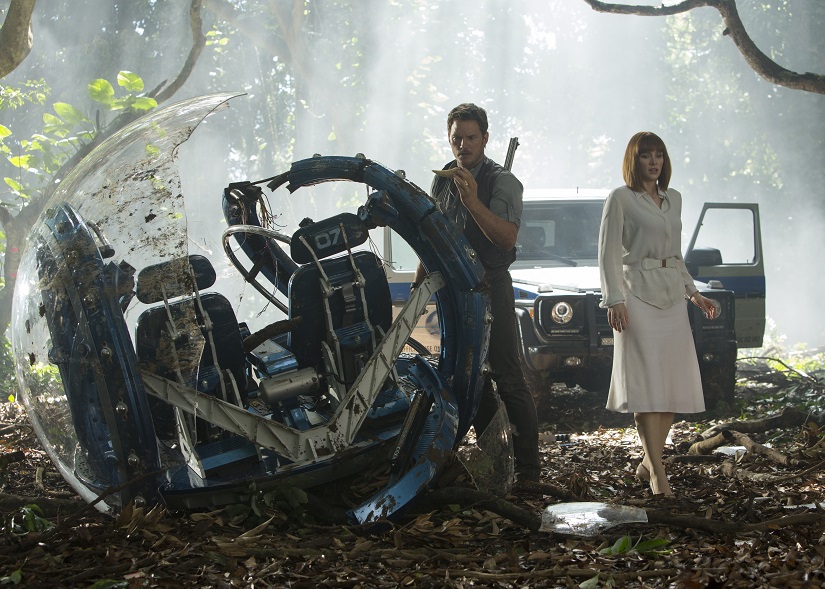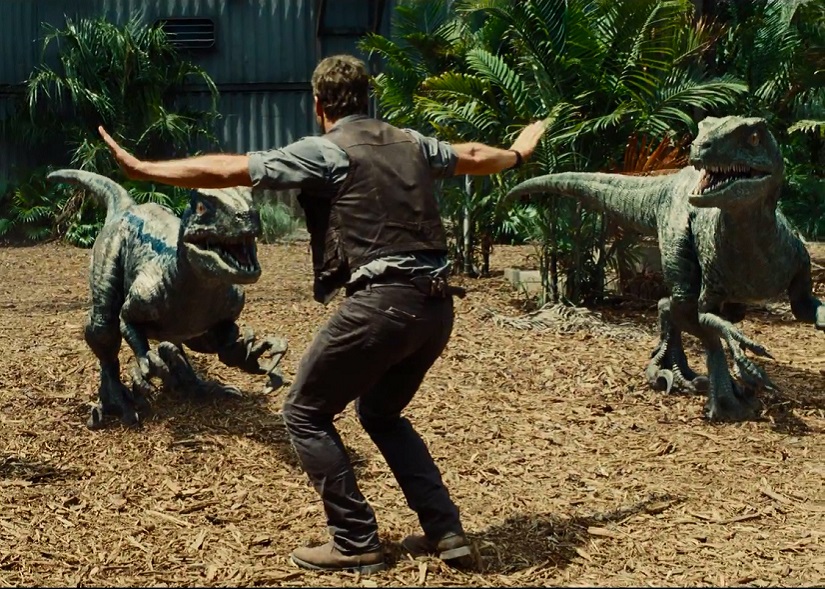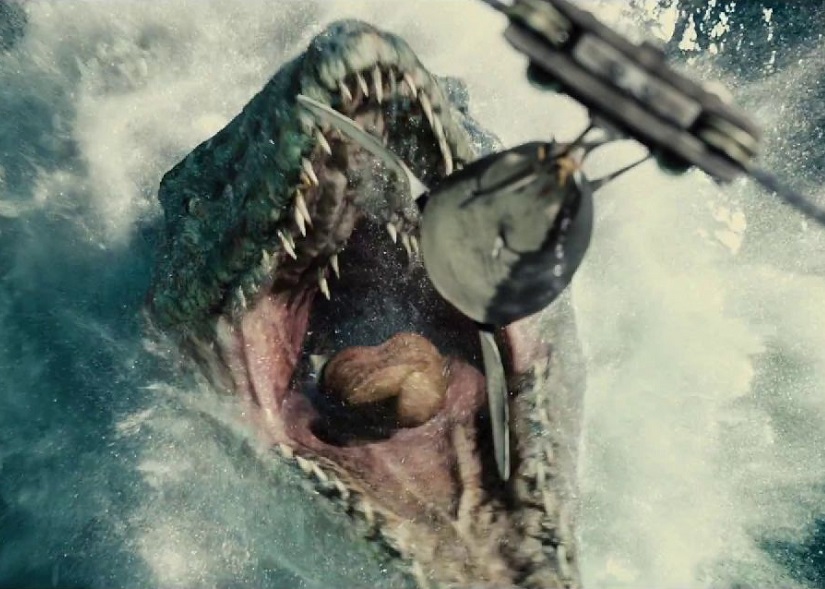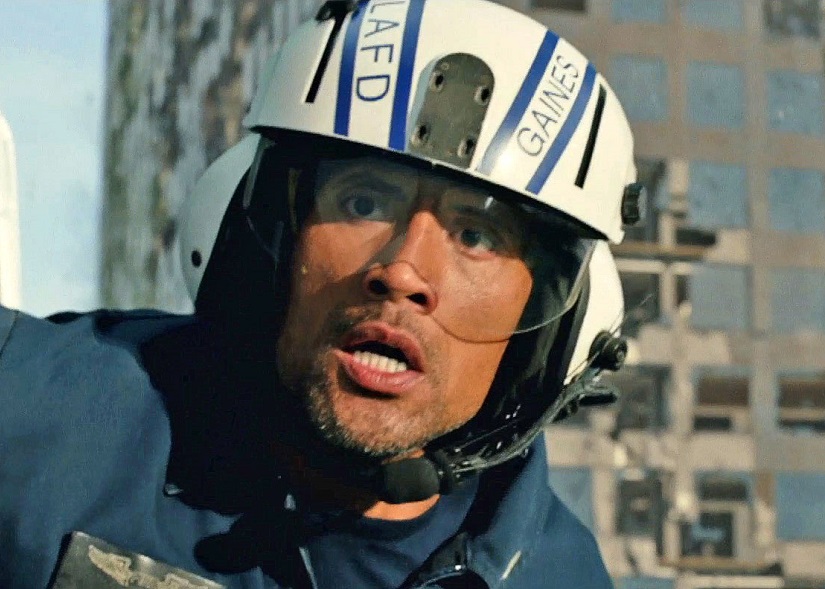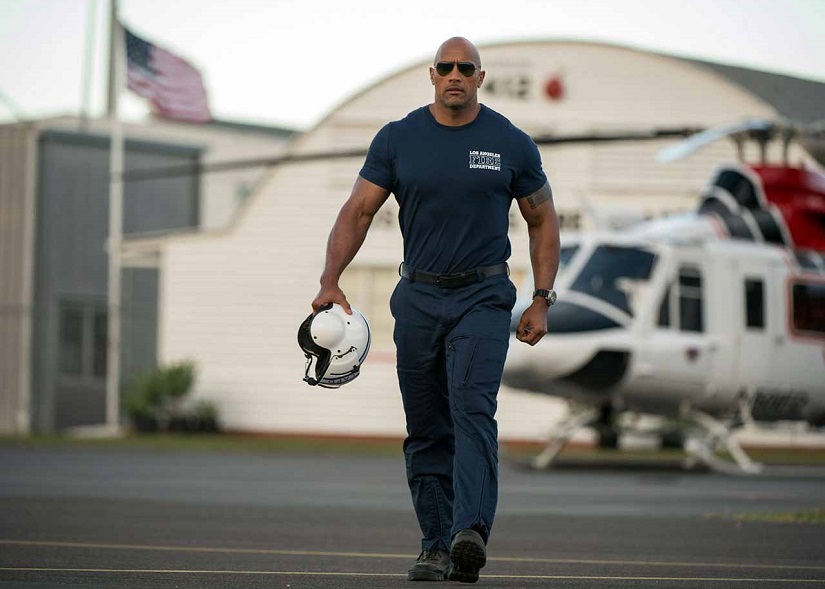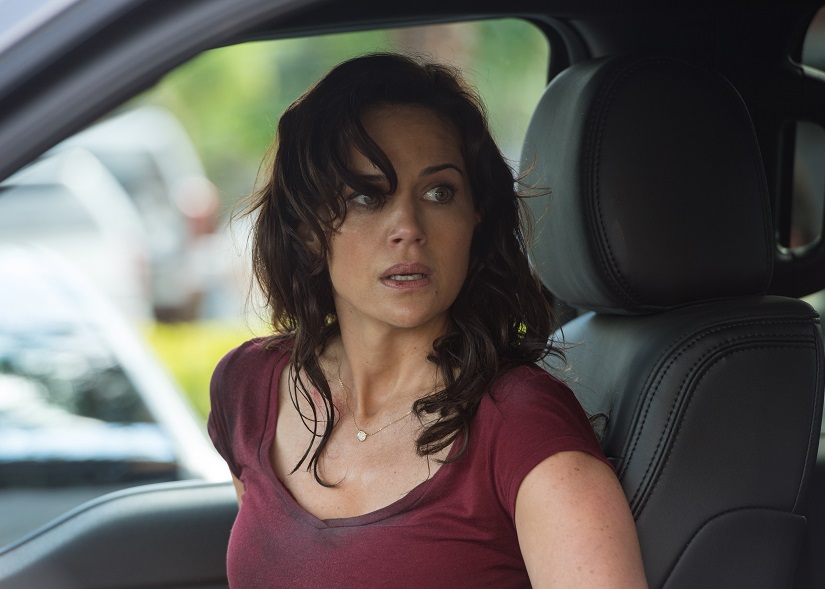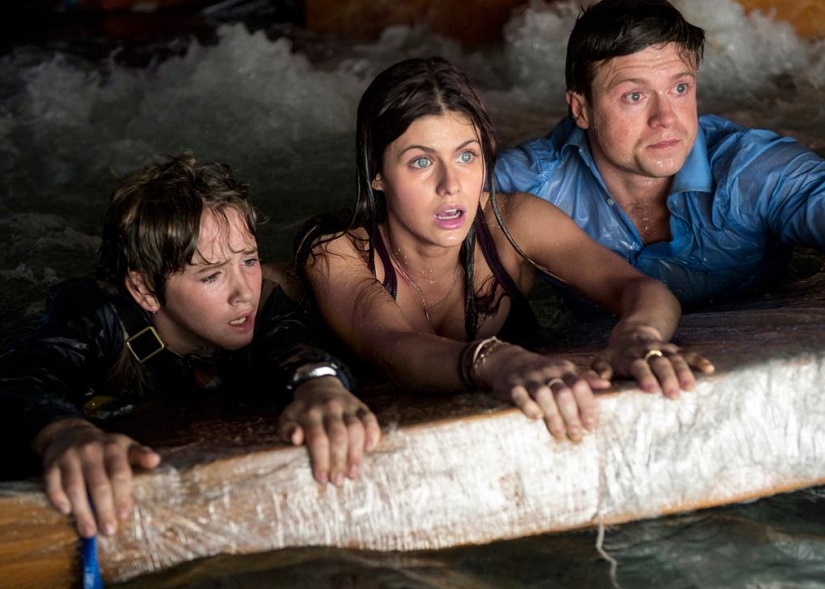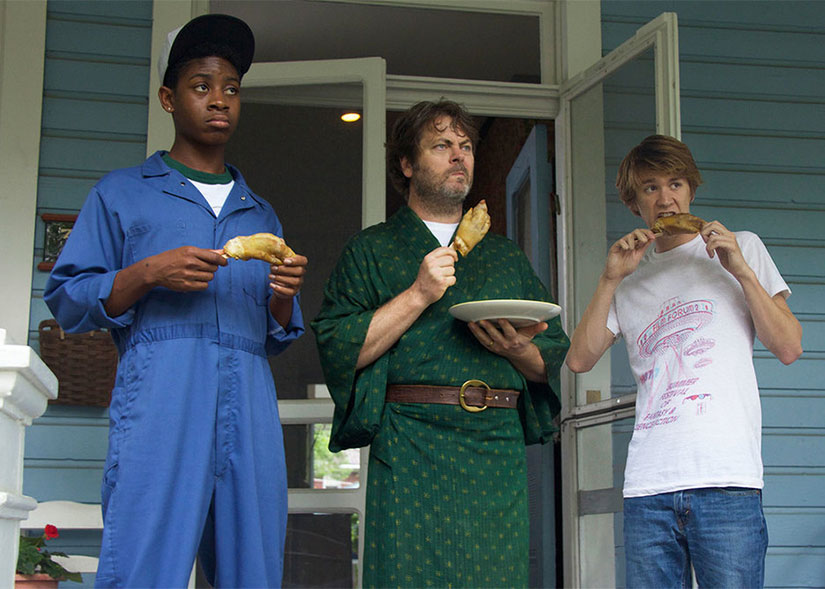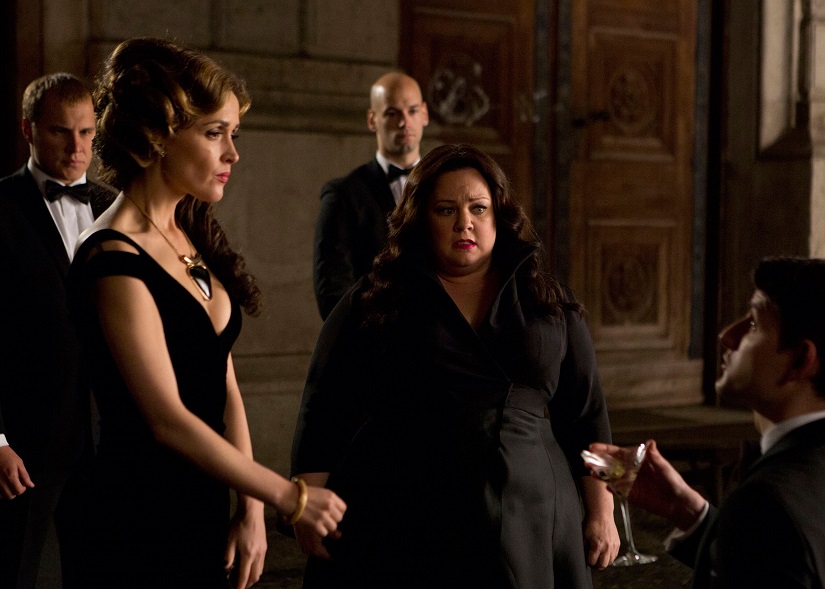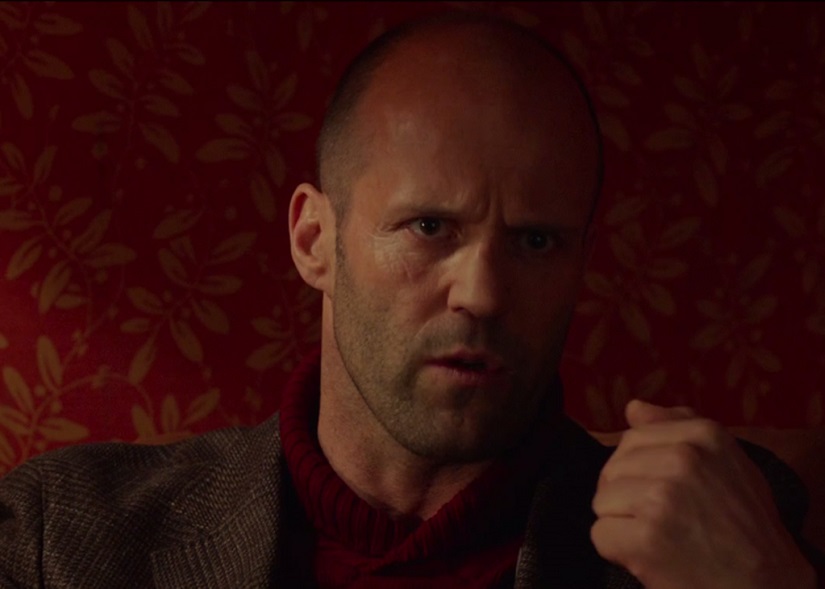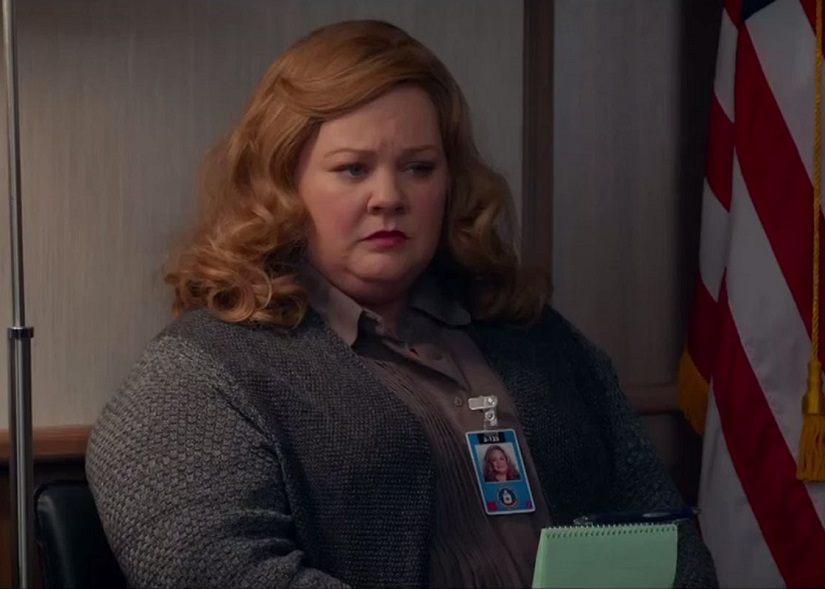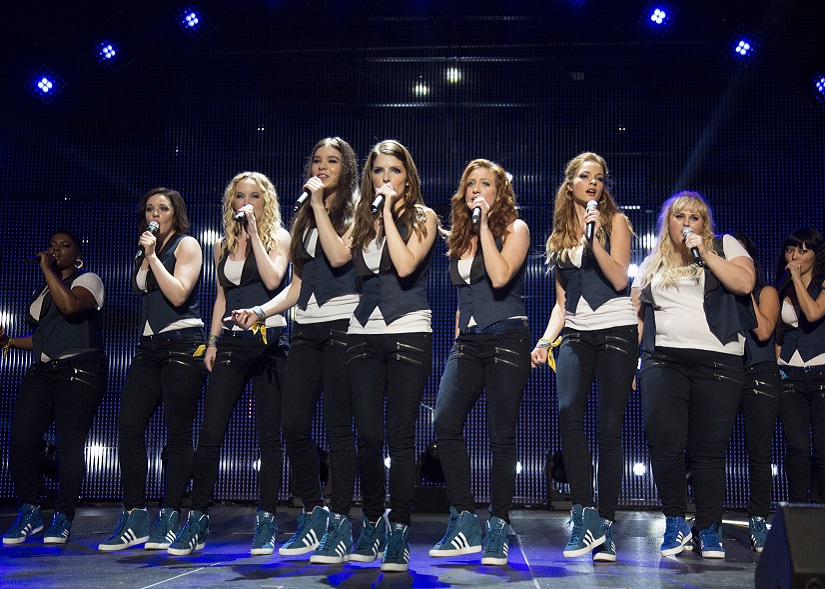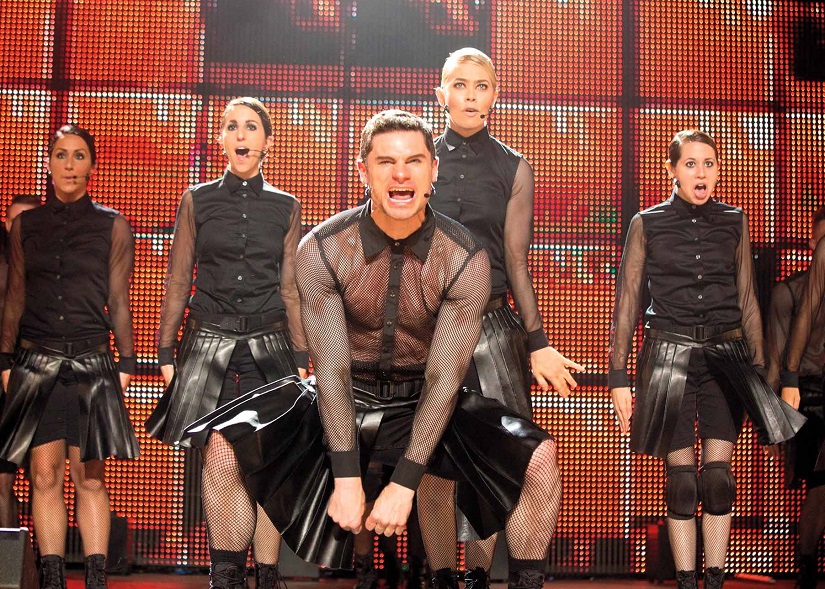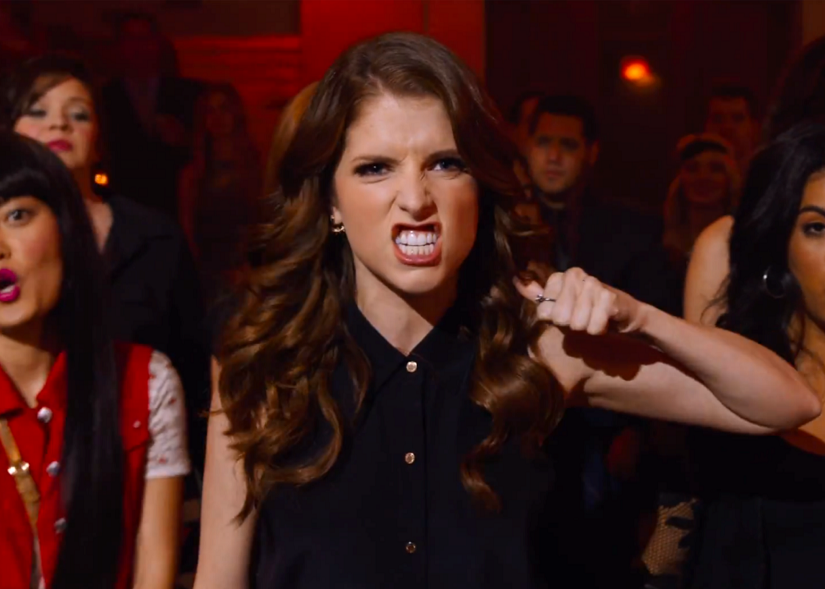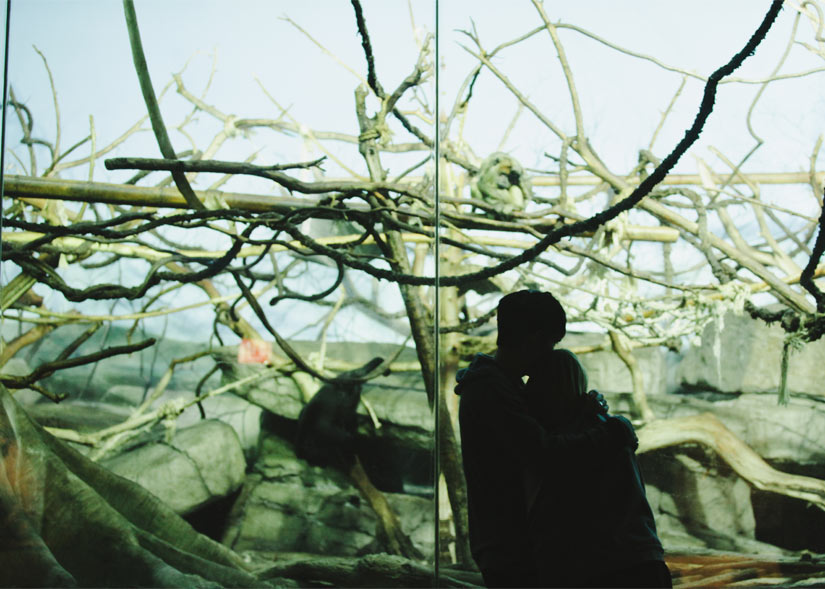[Review] The Overnight
[This review was originally published during our Sundance 2015 coverage. It’s being re-posted to coincide with the film’s limited theatrical release.]
The Overnight represented a change of pace for my Sundance 2015 coverage as the first comedy of the week amidst an onslaught of dramas. Featuring a stellar cast comprised of Taylor Schilling (Orange is the New Black), Jason Schwartzman (The Grand Budapest Hotel), Adam Scott (Parks and Recreation), and Judith Godreche (Stoker), The Overnight is a well-told comedy that utilizes a plot twist the likes of which M. Night Shyamalan could never accomplish.
The Overnight
Director: Patrick Brice
Rating: N/A
Release Date: January 23, 2015 (Sundance), June 19, 2015 (limited)
Making new friends as adults and parents can be difficult sometimes, especially when moving to a big city like Los Angeles, as Alex (Scott) and Emily (Schilling) discover. However, during a trip to the park, Alex’s son RJ (R.J. Hermes) befriends another boy, Max (Max Moritt), which leads to his father, Kurt (Jason Schwartzman), to introduce himself to the couple. After sensing something special within them, Kurt invites Alex and Emily over for dinner that night. As the night progresses and the liquor pours, Alex, Emily, Kurt, and Kurt’s wife Charlotte (Godreche) begin to form new bonds. However, things slowly begin taking a sinister turn as Alex and Emily soon realize Kurt and Charlotte might have ulterior motives for inviting them over.
The casting in The Overnight is spot-on with each actor fitting into their roles perfectly. Scott plays to type with the innocent, naïve Kurt, Schilling plays the strong, guarded Emily, Schwartzman plays the douchey but well-intentioned Kurt, and Godreche plays the sexy, sultry Charlotte. Each actor plays off each other well, especially when Scott and Schwartzman are given free reign to bounce off one another.
[youtube id="QoN2F22eUBA"]
The comedy in The Overnight is a bit raunchy, but not to Apatow levels. However, in saying that, expect some cod pieces and a plethora of pubic hair (too much, if you ask me). The visual gags are funny, sure, but as I mentioned earlier, the true humor is within the interaction between the cast. I’ve softened my stance in regards to Schwartzman over the past few years, and I think The Overnight helped me realize just how comfortable and proficient he is in playing wealthy, indulgent types while still being likable and relatable.
The Overnight is a different type of comedy that we see nowadays. It’s not too clever for its own good, nor does it rely on the raunchiness of its jokes. Rather, it combines the right amount of wit and perversion that anybody would enjoy.
[Review] Burying The Ex
Joe Dante is one of those directors you wish would get more work. At a time when any semblance of identity or creativity in blockbuster filmmaking is being increasingly calculated, focus-tested and formula-driven out of existence, Dante at his best brings a spirit of gleeful, unpredictable anarchism, a joy at throwing away the rulebook that is both very much his own and the product of his mentorship at the hands of the great B-movie maestro, Roger Corman.
Burying The Ex sounds like ideal Dante material, concerning a young horror buff, Max, struggling in his relationship with a controlling girlfriend, Evelyn, only for her to be hit by a bus on the day he finally decides to break up with her, then come back from the dead in zombified form just as he moves on and meets a kindred spirit from a nearby ice cream parlour. Unfortunately, despite all the premise's potential for Dante's brand of gunk-splattered cartoon chaos, he struggles to bring any life to an uninspired, pedestrian script that feels more like the extended pilot for a middling network sitcom called So I Dated A Zombie than a comeback cinematic outing for a great genre director.
[youtube id="MYlDjF8-sb4"]
Burying The Ex
Directors: Joe Dante
Rating: R
Release Date: June 19th, 2015
The movie is rated R, specifically for sexual content, partial nudity, some horror violence, and language. All of that may be technically true - the 'nudity' is especially partial - but far from any degree that one might expect to trouble the censors were this a higher budget release, backed by a more influential major studio. There's plenty of blood, but mostly used to cover faces rather than douse the walls, while a brain-eating scene is edited in such a way that any real semblance of gore is restricted to quick flashes. Dante's affection for discharging large quantities of boldly coloured gloop is satisfied by the zombified Evelyn projectile-puking embalming fluid all over the terrified Max, but played strictly for laughs - none too effectively, it should be said, making a jarring tonal shift amid one of many lackadaisical, drawn out dialogue scenes that should be more fun and energetic considering the material being covered - and hardly the sort of thing to turn away from. It's one of the tamest R-rated movies for a long time and the feeling pervades that the rating gives the movie's horror bona fides more credibility than they deserve.
Part of that is surely a result of the low budget, which leads to a significant number of scenes taking place in Max's front room. Dante had great fun contrasting the safety of suburban decorum with the ravages of the supernatural in Gremlins, but Alan Trezza's script denies him the chance to really dig into what zombified havoc Evelyn is capable of unleashing on Max's slow-paced hipster existence beyond one bout of vomiting and a handful of demonstrations of super-strength. In fact, there's a real argument that she does more damage in redecorating his front room prior to her (first) demise than she ever does following her resurrection. What's left is a series of quickly wearisome back-and-forths in which Evelyn re-asserts her desire to covert Max to the undead so they can be together forever, followed by his expressions of disgust at that desire and her steadily decaying flesh.
The unadventurous script limits the strong cast, of which Anton Yelchin, playing the put-upon Max, feels most subdued. Yelchin is a charismatic actor who has made a good impression in minor roles in not-so-good movies, but he plays Max so sleepily and lacking any response beyond mild surprise and concern at what should be a terrifying situation that he's hard to have sympathy for when he himself barely seems concerned by what's happening. True, he's not supposed to be a character of any great assertiveness or courage, but Yelchin tips the balance too far until it drops into virtual indifference. His half-brother, Travis, is supposed to be the more ribald and confident of the two, but is such a tedious slobby womaniser stereotype that, rather than being an invigorating presence who pushes Max to stand up for himself, it's a relief whenever he exits a scene. It also speaks to the movie's disappointing safeness that he boasts of sleeping around not with centrefold models from Playboy, but FHM, a magazine, like the character, stuck in eye-rolling late-90s ideas of laddish masculinity.
Ashley Greene fares better as Evelyn, pushing back against the tame material to unearth a little of the sadness behind her character's anger and control-freakery. The obsessive, domineering ex-girlfriend is another tired cliché, but Greene's history with the Twilight franchise makes for savvy casting as she finds small traces of humanity in her zombified form. Perhaps one of the movie's most debilitating flaws is that it in fact makes the living Evelyn too likeable and sympathetic, justifying her controlling nature with a sad backstory and a genuine, if overbearing, desire to love and be loved. Her eco-conscious do-goodery (working for a firm called 'Live Green Or Blog Hard', one of a number of not-quite-funny-enough Simpsons-esque workplace names) may be pushy and annoying, but it's hard to deny she has a point when calling out Max for not showing any motivation to improve his lot despite constant complaining. She's the most fully rounded character in the movie, far moreso than Alexandra Daddario's dreamgirl sweet Olivia, entirely defined by liking all the same stuff as Max, a dating site approach to a romantic lead where compatibility is calculated exclusively by the number of shared interests.
What is the real stake through Burying The Dead's heart is that Shaun Of The Dead, an even more low-budget zom-com, did everything Dante's movie tries to do to much greater effect eleven years earlier. The movie skirts around the idea of relationship angst among geeky mid-twentysomethings, but Shaun committed more fully to the idea of the difficulty of youngish men finding a direction in life outside their nerdy and nostalgic preoccupations, all the while being significantly scarier, gorier, sweeter and funnier. Nick Frost's Ed, in particular, is a much more sharply observed depiction of what Travis should have been.
There are glimpses of the picture Dante might have made had his budget been bigger, the writing been sharper, and had he himself maybe been twenty years younger, but they are few and far between, in the end only growing the disappointment that what ended up on the screen is so consistently stuck in second gear and tepid in its execution of already underwhelming ideas. Ashley Greene in particular deserves better, while Alexandra Daddario continues her wait for a movie role which puts her natural affability to more lively use than the girlfriend role. A Dick Miller cameo and a handful of amusing sight gags provide the slim pickings for Dante's fans, but as welcome as it is to see him back in any sort of cinematic work, it's a shame the result shows few real signs of life.
[Review] Jurassic World
Many people expected Jurassic World to be a hit, though few would have predicted quite how big a hit it would turn out to be. In retrospect, it's easy to appreciate how complete the movie's formula actually is: dinosaurs will always be a major draw for children, especially when fighting other dinosaurs, while older viewers have the strong nostalgia factor of Steven Spielberg's 1993 adaptation of Michael Crichton's novel, Jurassic Park, to lure them in. Throw in one of Hollywood's fastest rising stars in the shape of Chris Pratt, and suddenly that record-breaking take doesn't seem quite so surprising.
Despite its big reputation, the original Jurassic Park never won me over as completely as those whose nostalgia is among the many reasons World is on its way to global domination. There's no question that Park was an extraordinary cinematic event, one of the few movies of the past thirty years to inspire a genuine sense of awe in its viewers, but whether it coheres as a great film in its entirety, rather than a handful of magnificent scenes and a cast which happened to be a perfect fit for the material and each other, is up for debate. Regardless, the moments when it really delivered are rightly celebrated among the finest moments of Spielberg's glittering career and few can deny its importance as a cultural phenomenon of its time. For all its astounding financial success, Jurassic World seems unlikely to be held in such high regard in twenty years' time.
[youtube id="RFinNxS5KN4"]
Jurassic World
Director: Colin Trevorrow
Rating: PG-13
Release Date: June 12th, 2015
That's not to suggest Jurassic World is a bad movie per se, but one which is best taken with strongly tempered expectations. It delivers all the dinosaur-on-dinosaur action that viewers will be expecting and is certainly the best of the three Jurassic Park sequels, though that's faint praise if ever there were such a thing. It's a movie which feels acutely aware of the likelihood that a strong percentage of its audience will be children and subsequently inhabits that PG-13 middle ground where no matter how great the carnage depicted on-screen, everything remains strangely and distractingly bloodless.
One of the most uncomfortable examples of this is a prolonged, grossly misjudged death of one of the supporting characters, who for a good thirty seconds is thrown through a procession of increasingly nasty torments before finally being put out of their misery, all without a single drop of blood being spilt. There are many reasons to object to this scene in particular, not least its discomforting delight at inflicting extended cruelty on a character who seems to be being punished for nothing more than absent-mindedness, but the movie's refusal to show the consequences of its depicted actions even while pushing so far into unpleasantness makes for an uncomfortable disconnect from reality and a sense of weightlessness which permates the rest of the movie.
Taken strictly on the level of spectacle, the movie hits its marks comfortably. Director Colin Trevorrow emphasizes the wonder and scale of the park, which has been rebuilt and reopened on the same island as the original in one of countless nods. The iconic John Williams score - is there any other kind? - is put to full, thrilling use and for a moment, Jurassic World recalls that feeling of awe which rooted the original so firmly in the collective cultural memory. It's when the movie has to get down to the nitty gritty of telling an actual story, with logic and characters and other such troublesome distractions, that it starts to go off the rails. Chris Pratt may be an immediately charming presence, but doesn't have the idiosyncratic charisma of a Jeff Goldblum, the gravitas of a Richard Attenborough, or the everyman authority of a Sam Neill. He's hamstrung by material which forces him to recite a series of leaden gags in lieu of developing an actual character, while his repeated assertions of manliness come off as juvenile posturing.
Speaking of which, the movie's antiquated representation of gender has been the subject of criticism ever since the first clip from the movie was released. Unfortunately, far from being taken out of context, as Trevorrow suggested, the female roles are arguably even more retrograde than first imagined. This doesn't appear to be down to anything more malicious than the same clichéd writing which also wedges a needless and shorthand-y divorce subplot between the two young brothers acting as audience surrogates in the first act, but even writing as someone who is generally reluctant to apply outside politics to any form of storytelling, World's female characters are punished and diminished in the presence of the male characters, themselves exclusively drawn from stereotypical masculine archetypes. Dallas Howard's Claire isn't much more than a stiff for Chris Pratt's self-identified 'alpha' to wear down, and the one time she asserts herself, it's to tell a nerdy male character to 'be a man and do something'. Meanwhile, Vincent D'Onofrio's Vic is so outwardly villainous and one-note that the only surprise is him not getting a chance to do his own Dr. Evil laugh. Oh, and did I mention that the person subject to the prolonged death described earlier was a working woman? Read into that as much or as little as you will.
Fortunately, the action is strong enough to offset the tedious emptiness of the movie's human characters. The absence of one well-developed character does rob the movie of any tension, with the bloodlessness only adding to the impression they're no more real than the CGI creations swirling around them, but that innate dinosaur appeal is a powerful thing indeed. Despite the movie's snarky in-jokes about audiences becoming increasingly blasé in their demands for bigger and better, there's still a childlike joy in watching raptors on the hunt, pterodactyls in mid-flight, or the lumbering beauty of a diplodocus grazing peacefully in a verdant savannah. The movie's respect for its creatures and concern over humans' treatment and commodification of animals, makes for one of its few poignant thematic successes, even if it all goes a bit wrong when it starts fully anthropomorphising them for the sake of a staggeringly stupid final act: this is a very dumb movie for the most part, even in a series where plot holes are a longstanding tradition, but the climax really takes the cake in throwing all semblance of reality and logical behaviour to the wind.
Jurassic World's faults are those that might be expected from a movie which has emerged from over a decade in development hell. It seems to be trying to tell three stories at once, of which only the spectacle truly delivers. The original sketched its characters just delicately enough to allow its magnetic cast to do the rest. World overburdens its characters with contrived histories delivered through hilariously inane anecdotes which just so happen to offer inspirational messages perfectly suited to each moment of peril ('Remember when we went on that date?'/'Remember when I had that dog?'/'Remember when...' [and I'm not even joking here] '...we saw that ghost?'). It delivers well enough on its core requirements as a summer blockbuster tentpole that few will come out feeling as though they haven't basically seen the dinosaur extravaganza they were promised, but the constant nods back to Jurassic Park only serve as a reminder of how much better rounded that movie was in the small details which gave its action meaning and heft and connection. Like World, Park for the most part worked better in individual scenes than as a complete picture, but it's those details which made Park's scenes so jaw-dropping and are conspicuously absent here. Financial success makes a fourth sequel an inevitability, but when Jurassic Galaxy rolls around in a few years' time, let's hope it remembers to bring back the soul so missing in World's impressive but hollow spectacle.
[Review] San Andreas
Before watching San Andreas, I was curious to know how long it has been since the last genuine, unabashed big-budget disaster movie. Naturally, this meant the first port of call was the filmography of Roland Emmerich, the German director behind Independence Day and The Day After Tomorrow, whose career is virtually name-associated with the genre. As it turns out, his last true disaster movie (not to be confused with disastrous movies, of which he's released a couple since) was 2012 in, weirdly, 2009.
That was one year after the release of Iron Man, the movie which turned Marvel and the superhero movie into the face of the modern blockbuster. Given the mind-boggling destruction which the average comic book movie trades in - see Avengers: Age Of Ultron, or if you haven't by this point, don't bother - it's no surprise that the disaster movie has since fallen by the wayside. San Andreas feels like a throwback in that respect, but also very much conscious of the changing tastes of the time.
[youtube id="hnJPHYAlid8"]
San Andreas
Director: Brad Peyton
Rating: PG-13
Release Date: May 28th, 2015
Dwayne Johnson, aka The Rock, as anyone who ever had a childhood will know him, plays a helicopter rescue pilot who sets out to reunite his family when the biggest earthquake in human history hits California as a result of the San Andreas fault starting to shift. There's approximately nothing more to the plot than that. That's far from a criticism, however, as simplicity is a much undervalued quality at a time when every new release seems to burden itself with increasingly convoluted world-building and sequel-seeding. San Andreas tells a straightforward story, going from A to B without any deviations along the way, then ends with an actual conclusion. It's one of the genre's strengths and, at the present time, a welcome relief from the norm.
If you've watched the trailer - see above - you know what to expect. Buildings collapse, people run and scream, the hero overcomes a personal trauma to save the day, and a fulsome female lead runs around in a wet vest. All boxes ticked. What makes the movie more distinct from its forebears is the presence of The Rock, who is quite unlike any disaster movie protagonist in living memory. The genre typically trades in everyman heroes, rising above their own shortcomings to survive, often with the assistance of a team, an onslaught by the overwhelming power of mother nature. One look at The Rock tells you that's not going to be the case here. Trying to pass off a 6'3 former wrestler as an everyman isn't going to work, and it's interesting how his physique alters the fundamental dynamic of the relationship between the genre and its protagonist.
Unlike disaster movies past, San Andreas' protagonist is never the one in danger. At worst, there are instances where he looks a mite concerned, but he exists almost entirely beyond the reach of the disaster itself. It's his daughter, played by Alexandra Daddario (required to do nothing but be sweet and look attractive, tasks she rises to meet triumphantly), who is the one caught in the chaos and finding herself, along with a bland English boyfriend-in-waiting and his sarcastic younger brother, perpetually trapped under collapsing buildings and rooms rapidly filling with water. His ex-wife, played by Carla Gugino, momentarily finds herself in similar trouble, but is soon rescued to join Mr. The Rock for some relationship therapy as the entire West Coast of the United States crumbles around them.
The Rock's essential invulnerability gives San Andreas something of the superhero movie vibe. Surprisingly, this works quite effectively. One of the genre's biggest obstacles is that it needs to go bigger each time in order to retain the level of awe-inspiring visual spectacle on which it overwhelmingly relies for its entertainment value, yet as the likes of Avengers proves, there's a point at which wanton destruction becomes so ludicrous that it's hard to care anymore. With Mr. The Rock (his 'character' has a name, but it's not important since he's basically The Rock in a differently coloured tight shirt) effectively watching the catastrophe unfold in the same way as the audience, he becomes one of the genre's more effective surrogate characters in recent memory. This also makes his family drama with Gugino's Ex-Mrs. The Rock slightly more relatable, helped by the two actors playing it with a unexpected amount of sincerity.
What also works is that the movie doesn't shy away from the human cost of such a massive disaster. There are a handful of shots whose sole function seems to be showing people being wantonly taken out by falling debris and collapsing structures, which is perhaps a little tasteless (although if that's your main concern, you're watching the wrong genre) but also gives the destruction a palpable sense of weight and loss. It's not enough to redeem the tiresomely uncanny valley-ish CGI depictions of cities being swallowed, enflamed and/or flooded, but that commitment to showing the arbitrary cruelty of its disaster demonstrates a rare and admirable strength of conviction.
Existing entirely outside The Rock's immediate vicinity is Paul Giamatti's seismologist, whose character's name also feels unimportant since he's basically the stock Voice Of Authority Played By A Respected Character Actor. It's nevertheless odd how tangential to the story he is, even by the genre's standards, not sharing a single scene or communication with the three leads. He gets to run away from one disaster - saving a little girl and watching his ethnic minority colleague be sacrificed in a scene which leaves no cliché unturned - shortly and with no small sense of irony after predicting the inevitability of such an event, after which he's stuck delivering grave warnings into a television camera. While such roles are part and parcel of the genre, the time spent in his character's company feels very much like time-wasting (other than, perhaps, to dispel the myth that the best course of action in an earthquake should be to hide in a doorway, when under a table is in fact the better course of action), an impressive feat for a movie coming in under 2hrs long. I should probably post an image of Mr. Giamatti at this point, but if we're honest, I think if we'd all rather see Alexandra Daddario, so let's go with her.
While Giamatti's scenes are strictly disposable, conveying information which could just as easily by offered through radio broadcasts or other background noise, it's to San Andreas' credit that it otherwise cuts to the chase when it comes to reaching the big events that audiences will be paying to see. There's approximately no time for such inconveniences as logic, but again, if that's your concern then the genre is most definitely not right for you. Stuff happens entirely to fulfil audience expectations rather than real world, or even internal logic, and that's not a bad way to go about approaching this kind of material. The Rock has a singular goal, to reunite his family, and despite being a rescue pilot who has commandeered a helicopter at a time when one would assume all airborne vehicles to be invaluable rescue resources, has absolutely no interest in helping anyone other than two specific women, who rather helpfully, are the only two people he really comes across anyway. In one amusing scene, his ex-wife (who has, inexplicably, been lunching with Kylie Minogue) happens to be the very first person he sees upon flying into Los Angeles.
It's lightweight, disposable fare, easy to mindlessly absorb with friends and laugh about afterwards. As a genre turn, it's a perfectly solid one, occasionally edging towards poignance with its willingness to engage ideas of loss on both personal and wider scales. Despite the big budget, it's nevertheless difficult not to see its self-aware campiness as having been undercut to a large extent by the likes of Sharknado, itself even more unrestrained in its audience-pleasing ridiculousness. The Rock proves he can do solid work without the safety net of irony, nicely underplaying a protagonist whom audiences are expected to take at least somewhat seriously despite the events surrounding him. Gugino and Daddario are entirely serviceable in their limited parts and Ioan Gruffudd is suitably slimy as Ex-Mrs. The Rock's new husband, whose evilness is defined by his riches in a movie produced, directed, written by and starring presumably very rich people. Make of that what you will. Regardless, San Andreas is decent enough multiplex filler, a throwback with just enough tweaks to keep it interesting, if never exactly engaging. It's not exactly good, per se, but far from a disaster.
[Review] Me and Earl and the Dying Girl
This review is being re-posted to coincide with Me and Earl and the Dying Girl's theatrical release.
Going into Me and Earl and the Dying Girl, I expected something akin to The Inevitable Defeat of Mister and Pete in the sense that it would be a grounded, coming-of-age film about friends trying their hardest to get through adversity. In a way, I was both completely off the mark and somewhat on the money, but in the best ways possible. Simply put, Me and Earl and the Dying Girl ultimately proved to be the breakout film of Sundance 2015.
Me and Earl and the Dying Girl
Director: Alfonso Gomez-Rejon
Rating: N/A
Release Date: January 25, 2014 (Sundance)
Greg (Thomas Mann) has made it to his Senior year without pledging allegiance to any one high school faction, yet has built up enough rapport with each to not also cause friction with them. Despite this, he has no friends, save for Earl (RJ Cyler), his partner-in-crime since they were little. Together, they spend their lunches with their history teacher (Jon Bernthal) and watch classic films, even going so far as to re-create them. Greg's status quo is thrown off when his mother forces him to hang out with Rachel (Olivia Cooke), a fellow Senior recently diagnosed with leukemia. As their friendship progresses, the two begin to grow closer as Rachel's illness unfortunately begins to progressively get worse.
Greg soon begins to break out of his shell and actually finds himself as a whole, individual being rather than a transparent everyman meant to appeal to everybody. He also begins to form actual friendships and relationships (throughout the film, he refers to Earl not as his friend, but as his "co-worker" for fear of attachment and loss). The chemistry between Mann and Cooke is front and center for this progression. Mann's been building his star since his role in Project X, and Me and Earl and the Dying Girl is the perfect type of film to show off his penchant for both comedy and drama. Cooke's take as a girl inevitably facing death but still trying to not have the disease define her is more layered than the typical "damsel in distress," but is sometimes relegated to a supporting character to Mann's spotlit performance. However, Mann's performance wouldn't be nearly as strong were it not for his interaction with Cooke.
[youtube id="eCGyXDU0HOM"]
Throughout the film, snippets of the sweded films Greg and Earl shot are shown, similar to Be Kind, Rewind, homaging such varied films as Apocalypse Now (A Box O' Lips, Wow), Breathless (Breathe Less), A Clockwork Orange (A Sockwork Orange), and more, which should make for a good special feature when the film's released on home media. Beyond the easter egg nature of the films, they prove to establish Greg and Earl's characters, and represent the biggest subplot of the film that culminates in Greg's final film dedicated to Rachel. In a way, the completion of that film completes Greg's year-long journey to becoming a tangible person with tangible attachments and feelings.
Me and Earl and the Dying Girl balances comedy and drama perfectly, with the high and low emotional hits coming at the proper moments. By the end of my screening, there was a hushed silence as everybody processed everything they saw, which ran counter to the beginning of the screening with everybody laughing loudly. It's hard to make comedies and make people laugh, and it's hard to make dramas and make people think - it's doubly as hard to accomplish both effectively within the same film, but Me and Earl and the Dying Girl is more than able to carry the load. Better yet, while the film teases and hints at a romantic slant between Greg and Rachel, it smartly avoids going down that predictable path, proving that a dramatic film starring opposing sexes can be successful and entertaining without the necessity of romanticism.
For fans of independent coming-of-age films, Me and Earl and the Dying Girl will sit perfectly alongside your collection. Mann delivers a performance that should elevate his already rising career, Cooke will garner praise, and Cyler will hopefully find more open doors in which to showcase his talents beyond a sidekick role. When the hype begins to build for Me and Earl and the Dying Girl (and it will), know that, for once, it's actually truly justified.
[Review] Spy
After achieving stardom with her standout performance in Bridesmaids, Melissa McCarthy has become a divisive figure, at once a reliable box-office draw while being frequently accused of only being able to play one type of character and one style of comedy. Spy is her third collaboration with director Paul Feig, for whom she will also be headlining the female version of Ghostbusters in 2016. Her work with Feig has generally coincided with her best reviews, with the pair sharing a fondness for subversive, proto-feminist genre spoofs.
Those who have found McCarthy's schtick offputting in the past won't find much to win them round in Spy, an uneven but occasionally amusing bounce through the familiar stable of spy movie clichés. McCarthy's character, Susan Cooper, certainly fits comfortably into the actress' pantheon, exhibiting the expected reliance on pratfalls and foul-mouthed tirades that both fans and detractors have come to expect. What elevates Cooper above the likes of Tammy Banks, of the dreadful eponymous 2014 vehicle which deservedly earnt McCarthy many of her worst notices, is a willingness to allow McCarthy to explore a more outwardly vulnerable, yet secretly competent, side to her familiar persona.
[youtube id="mAqxH0IAPQI"]
Spy
Director: Paul Feig
Rating: R
Release Date: June 5th, 2015
As would appear to be the case with the upcoming Ghostbusters, and was to an extent also true of the previous Feig-McCarthy team-up, The Heat, Spy's most noteworthy trick of genre subversion is casting women in roles typically occupied by men. This idea drives the narrative more than might be expected. Cooper starts out as a highly skilled if unconfident CIA analyst, whose job is to support superspy Bradley Fine (Jude Law) via earpiece with all the information he needs to know to complete his missions, while she watches from the safety of her desk via camera and satellite feeds. When Fine and all the CIA's other agents are compromised, Cooper, the only agent unknown to the enemy, is sent out into the field by her boss (Allison Janney) to retrieve a nuclear weapon before Rayna Boyanov, daughter to a deceased supervillain, can sell it on the black market.
The idea of women taking over a traditionally male game is a rich one, but Spy doesn't offer as much of an original take on the genre as hoped. The movie ventures little towards exploring what unique approaches and challenges a woman, especially a 'plus-sized' woman, might face in the field - the only exception being Cooper having to fend off the advances of Peter Serafinowicz's lecherous Italian agent, which is never as funny as the movie seems to think it is and Peter Serafinowicz seems mildly embarrassed to involved. The female friendship angle is fun and affectionate, but has limited impact on the main plot beyond bringing hero and villain together. Instead, the same spy tropes which have provided easy fodder for spoofs since the James Bond phenomenon came into being in the mid-sixties are dusted off for another airing, even if most of them have long since been left behind in the genre's modern iterations and were already more effectively and lovingly sent up in the first Austin Powers movie. Cooper's competence is very welcome, encouraging viewers to laugh with rather than at, but has been an integral part of creating a likeable goofball spy ever since, to a less obvious extent, Get Smart.
The presence of women in the lead roles does give the movie a novelty value on which it cruises for a while, albeit one which is more the result of the spy genre's near total absence of diversity in its leads than anything much this movie in particular has to say beyond noticing it. Like Kingsman: The Secret Service, the movie promises an anarchic, progressive spin on a typically very conservative enterprise, this time focusing on gender rather than class, but lacks the strength of its convictions to allow its non-traditional protagonist to display anything more unique to them than the standard heroic traits. In fact, it's Jason Statham's Rick Ford who offers the funniest, most determinedly radical spin on the action hero archetype. The character exaggerates Statham's persona by a factor of ten, resulting in a deranged, hyper-masculine doofus with total confidence in his own ridiculous abilities and contempt for anyone, especially women, barging in on his territory. Statham's performances have always carried an undercurrent of self-parody, so it's no surprise to see him shine when given his first chance to play unabashedly comedic material.
That's not to suggest the women fare at all badly: McCarthy is perfectly likeable as Cooper, whose lack of self-belief and frustration at being stuck behind a desk make it all the funnier and more engaging when she's finally allowed to break free of her shackles and start tearing things up. Where a previous McCarthy character threatening to chop a henchman's dick off and stick it to his head (thus making him, to quote, a 'limp-dick unicorn') would've relied on nothing but abrasiveness to get the laugh, here there's a palpable sense of relief as Cooper finally finds the freedom to fully express herself without reservation. Rose Byrne's clipped, arrogant Rayna makes a terrific foil, and her double act with McCarthy allows for some of the movie's most memorable, often seemingly improvised, exchanges. Miranda Hart, likely less familiar to US audiences than UK ones, also does solid work as Cooper's gawky co-worker and best friend, Nancy.
Feig directs with a sure enough hand and shows a reasonable aptitude for action, especially in a one-on-one knife fight in the final act, but there's never any sense of him stretching himself or going the extra distance to give the movie any sort of visual identity of its own. Perhaps symptomatically of the material, his work is functional and fit for purpose, but utterly unremarkable in all respects bar giving McCarthy the freedom to improvise some sparky one-liners into an otherwise drab script, and on the negative side, not immediately vetoing Jude Law's dismal attempt at an American accent, presumably put in place upon realising that three of the five main CIA characters were being played by Brits.
Spy doesn't break as much new ground as it thinks it does when it comes to spy spoofs, and the lack of substance behind its gender-swapping conceit doesn't bode especially well for Feig's Ghostbusters reboot. It is, however, sufficiently lightweight and amiable to be a serviceable diversion at a time when the quality of big screen comedy has taken a slide when compared to that on television. The nuances added to McCarthy's character allow the actress to bring some depth and pathos to her confrontational persona, even if it's Jason Statham's balls-out lunacy which ends up stealing the show as one of the few genuinely surprising and chaotic elements in an otherwise entirely forgettable affair.
[Review] Pitch Perfect 2
There's a natural sense of trepidation when a sequel comes around to a small, unheralded movie which turned into an unexpected hit, as was the case for Pitch Perfect. The original may have been a barely disguised riff on Glee, aiming to latch onto the coattails of the series' popularity, but an excellent cast, slyly sympathetic characters and a surprisingly edgy line in humour combined to form its own version of the victorious underdog story. The difficulty in producing sequels to such movies is not only that the element of surprise is gone, but the need to raise the stakes over its predecessor can often lead to the small, personal charms which gave the original its identity being overlooked.
Pitch Perfect 2 doesn't escape that curse, but the first movie's delights are strong enough that the many elements which are carried over wholesale, whilst never as funny or fresh as the first time around, nevertheless make it far from A Ca-tastrophe. What, you didn't think you were going to get through a Pitch Perfect review without some A Cappella puns, did you? I'm afraid that much is positively A Ca-demic.
OK, that'll do.
[youtube id="uC0cBktoD-Q"]
Pitch Perfect 2
Director: Elizabeth Banks
Rating: PG-13
Release Date: May 15th, 2015
Pitch Perfect 2 follows all the sequel tropes to the letter, which means that having won the Nationals, the Bellas must now move onto the World Championships, facing off against the requisite superpowered Eurotrash villains, who go by the amusingly idiotic name of Das Sound Machine (DSM) - did no-one on the writing staff know even a second word of German? The stakes are also higher, with the Bellas in danger of being suspended from collegiate competitions following a wardrobe malfunction in front of a stock-footaged President Obama. None of it makes much sense (should the Bellas care about collegiate suspension when already competing globally? The movie doesn't investigate) but while that's not much of a problem in and of itself, because no-one in their right mind sits through an A Cappella movie expecting to be riveted by plot, it is representative of a rushed, slightly underdeveloped feeling that permeates much of the movie.
The original may have been as formulaic and straightforward as it goes, but worked that simplicity to its advantage by layering pathos and fun into the surrounding details. This time around, the central plotline remains unashamedly locked to formula but is bogged down by superfluous subplots that inform character only on the most superficial level and feature little meaningful interaction with the story we're here to see. Beca trying to use an internship at a record label to put in place the building blocks of a producing career, and her fears of not being good enough, is a fine idea, but adds no extra conflict or complication, barring a small amount of rapidly dismissed angst, to the Bellas' path to global domination. The same goes for a character-undermining romance for Fat Amy, whose appeal is rooted in her free-spirited independence. Neither offers anywhere near the required number of laughs or worthwhile performances to justify the time they steal away from the main plot.
The Championships plot is itself a bit of a mess, jam-packed with montages and pacing issues which means the event itself is compressed into a tiny amount of screentime. Were it not stated beforehand, you'd only know the finals take place in Copenhagen, for instance, thanks to one establishing scene barely lasting a minute. The number of tangents and diversions the Bellas go through never feel like anything less than padding, but are at least mostly enjoyable. A pre-Championships competition at a country club owned by David Cross doesn't serve any purpose, but brings in a handful of enjoyable music numbers as a like-for-like, if less character-driven, replacement for the first movie's riff-off. The boot camp later attended by the Bellas to rediscover themselves in light of the seemingly insurmountable competition of DSM also feels more like an excuse for the cast to have a fun few weeks messing around at a forest resort, but leads to a sweet bonding scene for the girls around a bonfire and brings out an unexpectedly affecting refrain for Anna Kendrick's 'Cups' song.
The relationship between the girls is the glue which holds the movie together, this time focusing on how each of them has been changed by the friendships formed in the group, continuing a long tradition of Bellas finding strength in each other. Newcomer Emily, daughter of a former Bella (played by Katey Sagal, whose lack of screentime and singing opportunities is verging on the disgraceful) effectively takes the role of second lead and is played with great warmth by Hailee Steinfeld. With a second Pitch Perfect sequel already on the cards, it wouldn't be a surprise to see Steinfeld take over as leader of the group from Beca, played by Anna Kendrick in a performance which feels like her first phone-in. The famous awkward Kendrick charm is all there, but on auto-pilot. Whether that's down to disengagement on her part or simply weaker material remains to be seen, because Rebel Wilson too struggles to hit the same blunderbuss highs as in her first run as Amy.
The movie is amusing throughout, but not as consistently laugh out loud as its predecessor. Part of this is down to more lines falling flat, with such potentially strong running gags as Beca's inability to come up with any solid burns against the physically flawless DSM members never achieving the laughs they should. The first movie's fondness for its characters' quirks is also replaced by what at times skirts perilously close to a mean streak. There's nothing wrong with indulging in ironic stereotypical humour, as the original did with aplomb, but here it too often feels as though the movie is falling back on it due to a lack of anything wittier. Newcomer Florencia (Chrissie Fit) adopts the same line in disruptive non-sequiturs about strange foreign customs as was previously stock in trade for Lilly (Hana Mae Lee), who is subsequently given less material. John Michael Higgins and Elizabeth Banks as Christopher Guest-esque oddball commentators once again provide some of the biggest laughs, but their interactions are more locked into a repeated format (he exuberantly delivers a sexist quip, she offhandedly cuts him down for it) than was the case first time around.
Banks also moves into the director's chair, having served as executive producer first time around, and her inexperience manifests in an infuriating refusal to let the performances and visuals work for themselves. The movie's rhythm is savaged with incessant camera movement and quick cutting, somehow squeezing two especially obnoxious cuts into an early shot of the Bellas walking across the Barden University campus. It settles as the movie progresses, but remains intrusive during the big numbers and flat everywhere else. Despite these complaints, the movie's affection for its characters, a set of catchy performances and the inherently likeable silliness of a world where A Cappella cheesiness is treated with life-and-death importance - the Eurovision Song Contest gone global, and slightly less hilarious - carries it over the line even if the ride is decidedly bumpier than first time around. There's nothing as memorable as vomit angels, Beca going into an impromptu rap or getting caught short in the shower (or a line as unintentionally funny as "You know David Guetta?"), but it should prove no less easily rewatchable. Even if this second performance is noticeably less finely tuned, it hits the right notes often enough to earn a passing grade.
[Review] ANIMALS
[This review was originally posted as part of our SXSW 2014 coverage. It is being reposted to coincide with the film's wide release.]
[youtube id="ApqHI23JJHw"]
ANIMALS
Director: Collin Schiffli
Rating: N/A
Release Date: March 9, 2014 (SXSW), May 15, 2015 (Theaters/VOD)
There have been many films about addictions in the past. For most, the first that comes to mind is Darren Aronofsky's Requiem for a Dream, a dark, sometimes satirical look at the consequences of various forms of addiction. In a way, what helped make Reqiuem such a great film was how digestible the film was due to some of its outlandish, sometimes satirical tone. Sure, it was a dark and gruesome film, but it was somewhat sensationalized and over-exaggerated at times that helped hide or shield some of the more serious moments.
In ANIMALS, addictions are once again front and center, but they shape and characterize the love story between the film's two leads, Jude (David Dastmalchian) and Bobbie (Kim Shaw). The couple is homeless, living out of a car parked right outside of Chicago's Lincoln Park Zoo, as they spend their days running elaborate cons to fuel their opiate addictions. As their options for low risk cons begin to run dry, Jude and Bobbie must turn to shadier jobs to supplement their growing addictions that cause friction in the couple's relationship.
Throughout the film, there's a foreboding sense of despair swirling around Jude and Bobbie, as is often the case within films similar to ANIMALS. However, the manner in which it manifests isn't something inherently dark, unlike the fall in the aforementioned Requiem for a Dream, but something that fits within the context of the film. That's not to say the drama or suspense is suspended; rather, it's understated and kept grounded in a way that makes it feel more realistic and natural.
ANIMALS is loosely based on Dastmalchian's personal struggle with opiate addiction years ago, so the intimacy and reality of the situation is derived from an honest place that doesn't sensationalize any aspect of addiction, something I feel most other drug films do. ANIMALS might not find wide distribution, so if you get the chance to catch it at an indie or small run theater, I highly recommend catching it.

